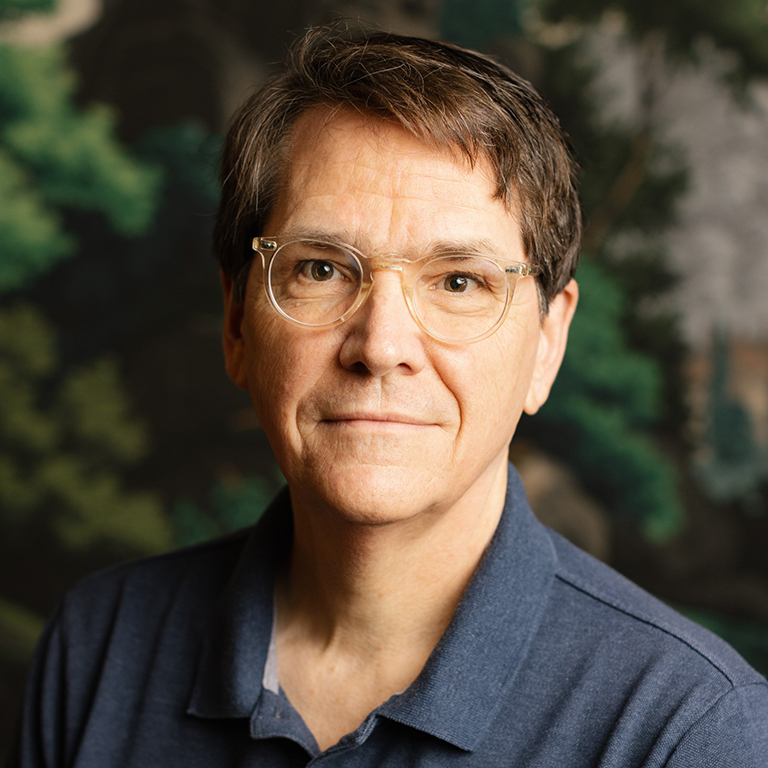- Ph.D., University of Michigan, 1988
- Mus.B., Piano Performance, Oberlin Conservatory, 1982
- B.A., Philosophy, Oberlin College, 1981

Gary Ebbs
Professor, Philosophy

Professor, Philosophy
The underlying goal of my research is to describe the methodology of rational inquiry from an engaged, practical point of view that we can reconcile with our best third-person descriptions of ourselves. I have written about truth, logical truth, rule-following, semantic anti-individualism, ontology, realism, contextual apriority, the analytic-synthetic distinction, and self-knowledge. I have also developed new readings of central writings by Rudolf Carnap, W. V. Quine, Hilary Putnam, Donald Davidson, Tyler Burge, and Ludwig Wittgenstein. I am the author of Rule-Following and Realism (Harvard University Press, 1997), Truth and Words (Oxford University Press, 2009), and Carnap, Quine, and Putnam on Methods of Inquiry (Cambridge University Press, 2017), and coauthor, with Anthony Brueckner, of Debating Self-Knowledge (Cambridge University Press, 2012). I have also published many journal articles and book chapters on the topics listed above.
I am currently writing a book that presents a systematic new reading of Quine’s revolutionary paper “Two Dogmas of Empiricism” and examines recent efforts to define and defend an epistemologically substantive analytic–synthetic distinction. My work in progress also includes papers about first-order logical validity, the method of explication, W. V. Quine’s account of the intersubjectivity of observation sentences, and the roots of Hilary Putnam’s semantic externalism.
The underlying goal of my research is to describe the methodology of rational inquiry from an engaged, practical point of view that we can reconcile with our best third-person descriptions of ourselves. I have written about truth, logical truth, rule-following, semantic anti-individualism, ontology, realism, contextual apriority, the analytic-synthetic distinction, and self-knowledge. I have also developed new readings of central writings by Rudolf Carnap, W. V. Quine, Hilary Putnam, Donald Davidson, Tyler Burge, and Ludwig Wittgenstein. I am the author of Rule-Following and Realism (Harvard University Press, 1997), Truth and Words (Oxford University Press, 2009), and Carnap, Quine, and Putnam on Methods of Inquiry (Cambridge University Press, 2017), and coauthor, with Anthony Brueckner, of Debating Self-Knowledge (Cambridge University Press, 2012). I have also published many journal articles and book chapters on the topics listed above.
I am currently writing a book that presents a systematic new reading of Quine’s revolutionary paper “Two Dogmas of Empiricism” and examines recent efforts to define and defend an epistemologically substantive analytic–synthetic distinction. My work in progress also includes papers about first-order logical validity, the method of explication, W. V. Quine’s account of the intersubjectivity of observation sentences, and the roots of Hilary Putnam’s semantic externalism.
“Kripke and Wittgenstein on Rules and Meaning,” in Claudine Verheggen, ed., Kripke’s Wittgenstein on Rules and Private Language at 40 (Cambridge University Press, 2024), pp. 107–123.
“Reading Quine’s Claim that Carnap’s Term ‘Semantical Rule’ is Meaningless,” in Sean Morris, ed., The Philosophical Project of Carnap and Quine (Cambridge University Press, 2023), pp. 135–153.
“Putnam on Trans-theoretical Terms and Contextual Apriority,” in James Conant and Sanjit Chakraborty, eds., Engaging Putnam (De Gruyter, 2022), pp. 131–155.
“Carnap on Analyticity and Existence: A Clarification, Defense, and Development of Quine’s Reading of Carnap’s Views on Ontology,” Journal for the History of Analytic Philosophy, 7(5), September 2019, pp. 1–62.
“First-Order Logical Validity and the Hilbert-Bernays Theorem,” co-authored with Warren Goldfarb, in Philosophical Issues, 28 (2018), pp. 159–175.
“How to Think about Whether We are Brains in a Vat,” in S. Goldberg, ed., The Brain in a Vat (Cambridge University Press, 2016), pp. 27–36.
“Reading Quine’s Claim that No Statement is Immune to Revision,” in Janssen-Lauret and Kemp, eds., Quine and his Place in History (Palgrave Macmillan Press, 2016), pp. 123–145.
“Putnam and the Contextually A Priori,” in Lewis E. Hahn and Randall E. Auxier, eds., The Philosophy of Hilary Putnam, part of The Library of Living Philosophers series, (La Salle, Illinois: Open Court, 2015), pp. 389–411.
“Conditionalization and Conceptual Change: Chalmers in Defense of a Dogma,” The Journal of Philosophy, Vol. 111, No. 12, December 2014: 689–703.
“Quine Gets the Last Word,” in The Journal of Philosophy, Volume 108, Issue 11 (November 2011): 617-632.
“Carnap and Quine on Truth by Convention,” Mind, Volume 120, Number 478 (April 2011): 193-237.
“Learning from Others,” Noûs, Volume 36, Number 4 (2002): 525-549.
“The Very Idea of Sameness of Extension Across Time,” American Philosophical Quarterly, Volume 37, Number 3 (2000): 245-268.
“Can We Take Our Words at Face Value?” Philosophy and Phenomenological Research, Volume 56, Number 3 (1996): 499-530.